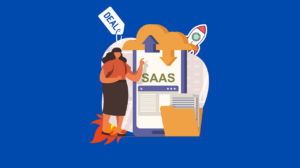To succeed, B2B marketers need to stop selling products and start selling outcomes.
I accidentally stumbled upon this idea while doing my research, reading a Forrester report. It instantly grabbed my attention and I could not get over how well it applies to the current status of the entire B2B market. The fact of the matter is that we are still stuck somewhere in the past, thinking that customers living in this highly competitive market will appreciate yet another different product in appearance, but the same in reality. The problem is that we have not yet learned that trying to manipulate our customers will one day come to haunt us in the worst possible manner, financially. You don’t want chargebacks, right? Well, if you don’t, then it’s time to scratch everything you knew and start fresh.
Here’s when that idea begins to make some sense.
You might have wondered: Ok, so if we are not selling products, what are we going to deliver? And why turn our backs on the market? There are software developers who make mind blowing profits by applying the traditional strategy. Why fix something that’s not even broken? Well, let’s take things one at a time, shall we?
Just Keep on Selling
First of all, you will continue to sell products, evidently, but the question here is how and not necessarily what. For instance, instead of saying you are selling a flawless, user friendly photo editing software, just like the rest of the entire market, by the way, you could say that you were selling pieces of life. Go for the experience, rather than the actual product. The outcome, remember?
The point here is to remember that by saying that your product is flawless, professional, high quality and other overused phrases, you are actually sending out a message saying that you know that these are problems this type of software generally stumbles upon. But you have fixed them all and customers ought to take your word for it and verify later, preferably after they have paid. When you are selling an experience, you are selling a feeling, a moment, something that cannot be measured, compared or reviewed. Why? Because experiences are personal. Use a general sales approach to sell specifically.
Own Your Market
Next, you are not turning your back on the market. You are just dominating it. Have you noticed the chess board? Only those pieces that have a meaning in the game carry a different design.
You want to be the king or the queen, even the bishop or the knight, anything is better than being one of the eight identical pawns. Turn your market into your own chessboard and grab control. Be different and you’ll at least get their attention. It’s a great way to start.
Profit, Product of Originality
Last, but not least, there is the question regarding profit. This is a rude misconception in my opinion and a phrase that should not be spoken. True success comes to those that are brave and not to those hiding behind traditions. It’s like following a cooking book written in the Middle Ages. You lack the ingredients, the taste has changed, the expectations are completely different. Those recipes could very well be responsible for some delicious meals, but not one person from this century is going to know, because they want something new, something fresh. You are giving old traditions to millennials. Throw the dice and go back three spaces. Check the market. Everyone’s the same. It’s like a tech uniform with nothing better to do than to excuse itself for mistakes that have not yet happened, but are going to.
Sell yourself differently. Sell the result, not the tool. The result is often translated in the mind of the client as a chain of emotions. Target those positive ones and sell the experience. Have the courage to be different in a world that is the same, left and right.





